July 20, 2017
Edited by David Sanders
Specimen Days
1304—Francesco Petrarch, Italy, poet (Italia Mia), is born.
1864—Erik Karlfeldt, Sweden, poet (Nobel 1918-refused; 1931-posthumous), is born.
1893—Richard Billinger, Austria poet/writer (From Where I Came), is born.
1897—Jean Ingelow, English poet (b. 1820), dies.
1900—Maurice Gilliams, Flemish writer/poet/essayist (Maria's Life), is born.
1901—William Cosmo Monkhouse, English poet and critic (b. 1840), dies.
1928—Kostas Karyotakis, Greek poet (b. 1896), dies.
1945—Paul Valéry, French author and poet (b. 1871), dies.
1982—Okot p'Bitek, Ugandan poet (b. 1931), dies.
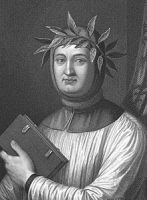
Wretched world, violent and changeable,
wholly blind is he who sets his hopes on you:
my heart was stolen away from you, and now is taken
by one who is already earth, and looses sinew from bone.
But the better form of her that lives, still,
and lives forever, in the high heavens,
makes me more in love now with all her beauties:
and I see, only in thought, as my hair whitens,
what she is today, and in what place she is,
and what it was to see her graceful veil.
—from “These days of mine, faster than a hind” by Francesco Petrarch
[trans. A. S. Kline]
“Wretched world, violent and changeable, / wholly blind is he who sets his hopes on you” – Francesco Petrarch
World Poetry
Instapoet Rupi Kaur Strikes Deal with S&S

Simon & Schuster UK is to publish Rupi Kaur's second collection of poetry The Sun and Her Flowers on 3rd October 2017. The book is the second collection of poetry and illustrations by Kaur, whose first collection, Milk and Honey (Andrews McMeel Publishing) was last year's bestselling poetry title by some distance, selling 33,656 copies for £272,337 – twice as much as the next bestselling poetry book, according to Nielsen BookScan. Sales are ramping up this year, with 44,482 copies sold for £365,723 in the first half of 2017 – five times better than the next bestselling poetry book.
Young Muslim Girl Takes on Islamophobes, her Poem Viewed by over 1.7 Million

With the growing rates of Islamophobia across the world, Muslims often find themselves in a position where they feel obliged to apologize for any terrorist attack carried out by so-called Muslims, but Suhaiymah Manzoor-Khan has a different take on this matter.The unapologetic 22-year-old Muslim took to the stage to express her frustration in a powerful message to Islamophobes. “If you need me to prove my humanity, I’m not the one that’s not human.”
Simon & Schuster UK is to publish instapoet Rupi Kaur’s second collection of poetry The Sun and Her Flowers.
Recent Reviews
Review: Howell’s “American Purgatory” Proves to Be Haunting Dystopian Poetry
by L.S. McKee
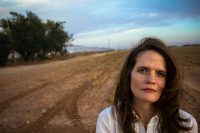
One could argue we live in the golden age of literary dystopia, with the resurgence in popularity of classics like George Orwell’s 1984 and Margaret Atwood’s A Handmaid’s Tale, as well as the emerging genre of cli-fi — speculative fiction set in a place of environmental devastation. In American Purgatory, winner of the 2016 Anne Sexton Prize in Poetry from Eyewear Publishing, Rebecca Gayle Howell takes on dystopia through the poetic imagination to haunting and chilling effect.
A Series of Fits
The Poems of Basil Bunting. Edited by Don Share
by Rory Waterman
For much of his often extraordinary life, which included spells as a prisoner and a spy, Basil Bunting was a neglected poet. His first publication, the pamphlet Redimiculum Matellarum (1930), meaning ‘a necklace of chamber pots’, was privately printed, and received one review – from his poet friend Louis Zukofsky. The same year, he had bigger success when his long poem ‘Villon’ appeared in Poetry, but it wasn’t until 1950 that a full-length collection, more pragmatically titled Poems: 1950, was printed in an edition of 1,000 copies. All the same, as Don Share has it in his introduction, ‘Bunting laboured in obscurity’.
Bedlam Salon
by Eric Ormsby
Ezra Pound was not the first poet to spend years confined to a mental hospital nor will he probably be the last, but he was surely the only one to have turned his legally enforced confinement into a long-running literary soirée, his very own “Ezuversity”. As Daniel Swift puts it in The Bughouse, his lively and searching account of Pound’s years at St Elizabeths Hospital in Washington, DC, from 1946 to 1958, it was “the world’s least orthodox literary salon: convened by a fascist, held in a lunatic asylum”. Though there has been much hand-wringing over the years by Pound’s acolytes about the incarceration, it proved to be in many ways a perfect environment for the garrulous poet.
Michael Robbins Reflects on Poetry, Pop Music, and Politics
by Sarah Aziza
Everyone you love will be extinguished, and so will you,” wrote Michael Robbins in 2015. In this essay — originally published in Poetry magazine and now the opening piece in his new collection, Equipment for Living: On Poetry and Pop Music — Robbins argued that art serves in part to remind us of our impending doom. At the same time, he continued, art can engender resilience and even offer comfort — a “sad and angry consolation” — in the midst of this march to oblivion. And perhaps, he suggested, with a tongue-in-cheek nod to Elton John, “the boulevard is not that bad.”
In American Purgatory, winner of the 2016 Anne Sexton Prize, Rebecca Gayle Howell takes on dystopia through the poetic imagination.
Broadsides
Why Bother with Poetry?
by A. E. Stallings
It’s OK not to like poetry. I don’t really follow sports. Some like one thing, some like another, as Horace says. Poetry was around before the alphabet (there is even a theory that the Greek alphabet was invented for the purpose of recording it) and is perfectly adapted to dissemination on the internet and, unlike novels, for reading on small screens. Why all the concern lavished on it – the United States has a National Poetry Month (April, of course), and there is an International Poetry Day, as well as an assortment of other examples of embarrassing boosterism? Poetry is not useful, and it is in every culture. Not only is it not endangered, it will outlast any number of species of living things on the face of the earth. It will only perish with our own. I worry about journalism. I don’t worry about Poetry.
Punishable Bodies: Poetry on the Offensive
by Vahni Capildeo
Enquiry: Essays on offensiveness, risk and the risqué
“You don’t understand how offensive this poetry is,” I held myself back from saying. “No, please, wait. This poetry would offend a lot of people. It has the capacity to do that. Don’t applaud it until or unless you understand that.”
We were four poets: Gregory Pardlo, Shivanee Ramlochan, Natalie Diaz, and Vahni Capildeo. We had met in New York for ‘Poetry and Desire: A Reading and Conversation’, co-sponsored by Poets’ House and the PEN World Voices festival. It was early summer. Shivanee Ramlochan had just finished reading from her (forthcoming) first book, Everyone Knows I Am a Haunting (Peepal Tree, 2017). In her poetry, there are abortionists; transvestites; rape survivors who accuse the police and invoke Shakespeare; multi-gendered women-born, whose sexual desires are expressed in images of attack and dismemberment: an abundance of queer personæ. The audience, sitting with their backs to the plate-glass that gave onto the darkening streets, feasted on the richness and bravery of it. We writers sat looking out at them, and into the night that seemed not so much falling on us as being pulled up from the river.
The Secret Lessons of Soviet Children’s Poems
by Ania Aizman
“The Fire Horse,” a new translation of Soviet children’s poems, collects works that spoke to young readers over the heads of censors about defending the territory of the imagination.
When my family left the collapsing U.S.S.R., we took with us the Russia we wanted to remember: classic volumes passed from one generation to the next, carbon-copied samizdat, and beloved mass-market storybooks, concealed in luggage and clothing. Every day after school in Israel, where we immigrated, my sister and I would sit in the kitchen, spellbound as my grandmother conjured up the ghosts of Russia’s literary past. As a child, my grandmother had considered reporting her parents to the authorities for their anti-Soviet talk; she had cried into her school uniform when Stalin died. But the de-Stalinization processes of the Thaw and Perestroika, in which archives were opened, and hundreds of thousands unjustly persecuted people freed and rehabilitated, released untold numbers of suppressed literary masterpieces to a public hungry for the truth.
It’s OK not to like poetry. I don’t really follow sports. Some like one thing, some like another, as Horace says.
Drafts & Fragments
The House of Genius Welsh Poet Dylan Thomas Goes on Sale
by Deborah Stone

Although the Boathouse where they lived is now open to the public it was the two years they spent at nearby Seaview that Caitlin has been quoted as saying was “the happiest period of our lives together”. Caitlin was pregnant with their first child and the Swansea-born writer was working on collections including The Map Of Love when they rented the house in 1938 for two years. Guests included American playwright Arthur Miller, briefly married to Marilyn Monroe, and the poet TS Elliot, whose Old Possum’s Book Of Practical Cats became Andrew Lloyd Webber’s musical Cats.
Poetry In the News
Travis Mossotti Named 2018 Miller Williams Poetry Prize Winner
Travis Mossotti has won the 2018 Miller Williams Poetry Prize for his collection Narcissus Americana. Two finalists were also named: Roy Bentley, for his collection Walking with Eve in the Loved City, and P. Scott Cunningham for his collection Ya Te Veo. The winner and finalists are selected by former U.S. Poet Laureate Billy Collins. The University of Arkansas Press will publish all three books, and Mossotti will receive a $5,000 cash prize in addition to publication.
Chicago Teenagers Use Poetry As Activism
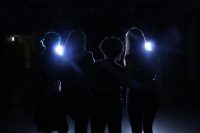
“…Donald, baby, I will be here long after you’re gone!”
These words, spoken in unison before stomping off stage by four teen poets in Chicago, are part of a powerful poem meant to leave an impact. The Goodman Theatre Youth Poetry Ensemble (performing as "Team Good Eddy") uses the line — which is pointed at the 45th president — to conclude its aptly-titled, award-winning work, “Pussy Grabs Back.”
The Goodman Theatre Youth Poetry Ensemble recently performed a poem directed at the President titled “Pussy Grabs Back.”
New Books
The bright red horse―and the blue―
by Katy Lederer
[Paperback] Atelos, 64 pp., $17.50
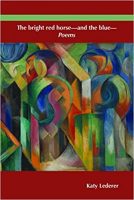
A collection twenty years in the making, The bright red horse―and the blue―— is a meditation on longing, love, and heart break as they manifest in lyric form. A series of thirty- one unusually sculptural pieces, the poems are, by turns, seductive, ecstatic, unyielding, and resigned. As a subject, the poems' speaker is both fulsome and bereft, searching, through the penetrating vision of her lines, for the relief of an unsustainable devotion. While formally efficient, the series is emotionally profligate, and the reader is left by the end of the collection with the knowledge that the speaker has been irrevocably transformed. Accompanied by an Afterword elucidating the unusual process by which the series came to be, The bright red horse―and the blue― reproduces like no other book the tender discipline of heartbreak.
Almost Human: Poems by Thomas Centolella
[Paperback] Tupelo Press, 98 pp., $16.95
As in a profound love affair, Thomas Centolella's new poems register attraction, delight, expectations fulfilled and foiled, and moments of great feeling cherished and/or lamented. Employing the vividness of narrative without yielding to its linear strictures and overly familiar tonalities, many of the first-person protagonists in Almost Human are mysterious figures at once engaging and idiosyncratic, even outright eccentric. Often betwixt and between, neither here nor there, they are uncertain of actually getting anywhere. Almost Human documents the restive life-force incarnated in an endangered species — our own — and charts the movement of the self between spirit and human, recalling the idea, attributed to Teilhard de Chardin, that we aren't human beings having a spiritual experience but spiritual beings having a human experience.
Clinch River by Susan Hankla
[Paperback] Groundhog Poetry Press, 92 pp., $14.00
In Susan Hankla's debut poetry collection, Clinch River, Appalachian women can dirt in Mason jars, push husbands down wishing wells, and try to read the signs on Hostess cupcakes. This landscapes is made of thorns, where the golden fleece of ambitions snag on troubles. A woman leaves town just so she can write a love letter to her husband. Another dispatches her man down the well. A real body of water in Appalachia, the Clinch is also a clenching river that baptizes souls as it takes them. Through lyrical narrative poems peopled by school friends, veterans, and ghosts, Hankla presents the poverty of the psychic wound, such as regret, as well as the wounds that poverty asserts, such as longing.
Descent & Other Poems by Timothy Ogene
[Paperback]Deerbrook Editions, 70 pp., $16.95
"Timothy Ogene's poems are writings of witness, displacement and beauty. Instead of a home address there are poems as address, at once exquisitely gentle and acute. The sharpness of the poems' blades —whether literal, like the blades that peel cassavas and leave the speaker's arms scarred, or deeper injuries of trauma and loss—sits alongside their subtlety and tenderness. These are poems of deep attentiveness to the smallest encounters, and to the largest questions of love, doubt, solitude and migration. Their crafting reveals Ogene's deep reading, both of poetry and of the landscapes the poems explore. How do poems that bear witness to violence, loss and displacement open so gently to the reader? This paradox is one of many in these wise, important poems. I am reminded of Hélène Cixous's description of Paul Celan's poetry as 'writing that speaks of and through disaster such that disaster and desert become author or spring.' Where trees hold 'time in absent leaves,' these poems mourn roots but refrain from 'easy paths,' offering, instead, the force and grace of a numinous poetics."— Felicity Plunkett
Where Is North by Alison Jarvis
[Paperback] Silverfish Review Press, 88 pp., $16.00
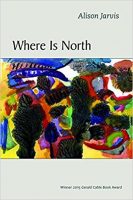
"In Alison Jarvis' extraordinary Where Is North, a life unfolds between breath-taking love poems. There's a powerful arc, but it's a vortex, more visceral than linear. Dramatic moments enclose each other like Russian dolls, 'the future falling back into itself,' so that the air between I and Thou becomes charged with the trials of childhood, the rigors of history, the mirror-life of dreams… Where Is North is a profoundly necessary book for our strange era."—D. Nurkse
In Alison Jarvis’ extraordinary Where Is North, a life unfolds between breath-taking love poems.
Correspondences
A Convergence of Gazes: Gjertrud Schnackenberg on "Afghan Girl"
by Susan Gillis
I was enjoying my second coffee on a quiet morning some time ago when this message from Gjertrud Schnackenberg arrived in my inbox.
Dear Susan, At last I’ve finished the poem I’ve been working on day and night since October, 2012. When I began the poem I was overjoyed because I thought it would be a short poem, and I always want and hope to write short poems — but as weeks turned into months and years, the writing began to feel like a dream in which I was using magic scissors to cut into it and cut into it, and with every cut, the poem grew longer and longer.
She had attached a file. I put down what I was doing and opened it, and began reading. And re-reading. It was, to put it simply, astonishing.
The Rumpus Interview Project #92: Bud Smith
by Nicholas Rhys

It’s hard to say when I first became aware of Bud Smith’s writing. I’m sure it was online; his work is fairly ubiquitous here—an essay here, a poem there, a short story someplace else. He’s got a few books under his belt to boot, the stellar F-250 and Calm Face, as well as the most recent, Dust Bunny City, for which his wife, Rae Buleri, did the brilliant illustrations. Bud’s writing is unpretentious and refreshing. He writes about his life and work. Smith’s day job is at an oil refinery in New Jersey (or night job, depending on the shift). It’s all fairly romantic—a blue-collar union worker who moonlights as a poet/writer—but it’s true.
Poet Laureate Dana Gioia Talks Rhyme (and reason) as He Heads to San Diego
by John Wilkens
Twenty-five years ago, Dana Gioia wrote a book called “Can Poetry Matter?” that spurred an ongoing debate about the role of the art form in American life.
He went on to head the National Endowment for the Arts for six years and is now California’s poet laureate, where he’s on a mission to visit all 58 counties and nurture an appreciation for what he calls “the conversation of the spirit.”
Bud Smith’s writing is unpretentious and refreshing. He writes about life and work. Smith’s day job is at an oil refinery in New Jersey.
Envoi: Editor’s Notes
Lessons from the Past: Dylan Thomas
“Poetry, to a poet, is the most rewarding work in the world. A good poem is a contribution to reality. The world is never the same once a good poem has been added to it. A good poem helps to change the shape of the universe, helps to extend everyone's knowledge of himself and the world around him.”
—from Quite Early One Morning by Dylan Thomas
“Poetry, to a poet, is the most rewarding work in the world.” – Dylan Thomas